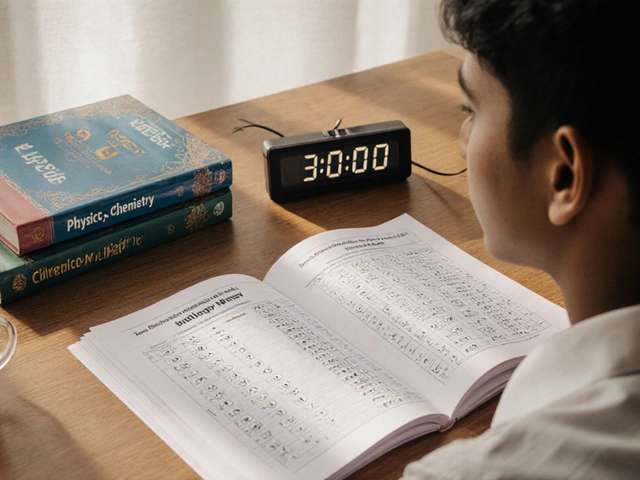If you want to speak English better but you've got no one to talk to at home, you're not stuck. Most people think learning to speak a language means moving abroad or joining a class, but actually, tons of top English speakers never left their hometowns. They just knew some clever tricks to practice by themselves. You can do it too, and way faster than you think.
The key is speaking out loud, even if it feels odd at first. Seriously—talking to yourself about your day, your breakfast, or even your to-do list helps your brain get used to forming sentences on the fly. Don't worry if you make mistakes; that's the whole point. Try recording yourself and listen back. It's awkward, sure, but you'll instantly spot words you need to work on.
Don’t stop there. Voice assistants like Siri, Google Assistant, or Alexa are perfect for quick practice. Try asking your smart speaker for the weather, set reminders, or just have a short chat every morning. These tech tools can help you get comfortable speaking and listening. Plus, you get instant feedback, which is way better than just reading from a book.
- Talk to Yourself: Why It Isn’t Weird and How It Works
- Use Tech Tools to Practice Speaking in Real Time
- Turn Everyday Activities into English Practice
- Find Your Speaking Community Online
Talk to Yourself: Why It Isn’t Weird and How It Works
It might sound odd, but talking to yourself is actually one of the fastest ways to improve English speaking skills right at home. Loads of language learners, not just beginners, use this trick because it works. Neuroscientists have found that speaking out loud activates more parts of your brain than silent reading. So, the simple act of saying your thoughts in English starts wiring your brain for speaking, not just writing or reading.
You don’t need a fancy script. Just describe what you’re doing and what’s happening around you. Brushing your teeth? Tell yourself, “Now I’m brushing my teeth with minty toothpaste.” Watching the clock tick? Say, “It’s almost 8 o’clock and I need to get ready.” The magic is in getting into a daily habit, so your mouth and brain start working together in real situations, not just in your head.
If you want to check your progress, record your voice using your phone. When you listen back, you’ll notice where you hesitate or mispronounce words. It’s like watching a replay of your own game—what you spot, you can fix. Try repeating tongue twisters or reading news headlines out loud for practice. Mix it up by pretending to have conversations, like ordering food or making a phone call.
- Start easy: narrate your morning routine in English.
- Level up: imagine explaining your favorite hobby to a friend.
- Go big: practice telling a short story or a funny incident you remember.
This habit chips away at fear and embarrassment. Before you know it, those awkward pauses get shorter and your confidence shoots up. No one’s around to judge, so you can push yourself and have some fun with it.
Use Tech Tools to Practice Speaking in Real Time
Let’s get real: nobody has time to sit through boring grammar drills every day. If you want to improve English speaking at home and see results fast, your phone or laptop can be your best ally. Loads of free and paid apps, software, and websites are made just for speaking practice—no classroom needed.
Apps like ELSA Speak, HelloTalk, and iTalki let you record yourself, talk with native speakers, or get instant feedback on pronunciation. According to ELSA, daily practice just 10 minutes a day can cut your accent by up to 40% in two months. And that’s not even counting video chat platforms like Zoom or Google Meet, which let you jump into real conversations with study buddies or even total strangers practicing English worldwide.
| Tool | Main Feature | Free Version? |
|---|---|---|
| ELSA Speak | AI pronunciation coach, feedback | Yes |
| HelloTalk | Connects with native speakers | Yes |
| iTalki | Live speaking lessons | No (paid lessons) |
| Google Assistant / Siri | Conversational practice, Q&A | Yes |
Want some free coaching? Most smartphones now let you use voice assistants like Siri or Google Assistant. You’ll notice real improvements just by asking a couple of questions every day and repeating things you hear. The more you talk, the better your pronunciation and fluency will get.
Don’t take my word for it. Here’s what Dr. Paul Nation, a known expert in language learning, says:
"Speaking often and getting real-time feedback is one of the fastest ways to improve conversational skills. Tech tools make it easy, even for those stuck at home.”
If you like games, Duolingo’s speaking challenges can be super motivating. Not the same as chatting live, but the reminders and rewards help keep you on track. Tip: turn auto-correct and speech recognition features on—you’ll quickly learn where you keep messing up certain sounds or words.
If you want to take it up a notch, jump into group video calls or English-speaking clubs online. Sites like Meetup and Discord host groups just for practicing English, so you’re only a click away from live practice. It’s awkward at first, but you’ll get comfortable super fast—and you might pick up some popular phrases native speakers actually use.

Turn Everyday Activities into English Practice
It’s easy to squeeze English practice into your daily routine without blocking out extra study hours. Everyday stuff—cooking, cleaning, even scrolling through your phone—can become quick lessons if you set it up right. The secret? Make English a part of what you're already doing instead of adding new chores to your day.
Start with labels. Seriously, grab some sticky notes and label things like your fridge, mirror, coffee mug, and TV in English. Seeing those words all the time, you’ll remember them way faster. A study from the University of Maryland found that labeling items in your target language at home actually boosts vocabulary retention by up to 35% compared to traditional methods.
- Follow recipes in English when you cook. Use YouTube or even recipe apps that are in English. If you mess up, you’re just making dinner more interesting.
- Switch your phone and social media to English. Messages, notifications, even menus—your brain will adapt way quicker than you think.
- Try talking through what you’re doing out loud in English. For example, when making tea: “I’m boiling the water. Now I’m adding sugar.” This helps you think in English without freezing up.
- Listen to English podcasts or audiobooks as background noise while cleaning or working out. Even if you don’t catch everything, you’ll get a sense of real-world speaking speed and accent variety.
To show how easy this is, here’s an example schedule of ways to use improve English speaking during a typical day:
| Time | Activity | How to Practice English |
|---|---|---|
| 07:30 AM | Making Breakfast | Describe steps aloud in English |
| 09:00 AM | Commuting or Walking | Listen to an English podcast |
| 01:00 PM | Lunch Break | Watch a short English YouTube video |
| 07:00 PM | Exercise/Chores | Try naming objects and actions in English or follow an English workout video |
| 09:30 PM | Before Bed | Summarize your day in English, out loud or in a voice note |
Making English part of life like this pays off. After a few weeks, you’ll start thinking in English during those tasks—even if no one’s listening but you.
Find Your Speaking Community Online
You don’t need to travel overseas or wait for someone at home to practice conversation. The internet is loaded with platforms where you can find speaking partners and actually use English in real life. Some of these sites are built just for language learners, and they’re packed with people who want to talk as much as you do.
The most famous platforms are probably iTalki, Cambly, and HelloTalk. iTalki connects you with teachers or casual conversation partners from around the globe. Cambly offers instant video chat with tutors 24/7—even if you only have ten minutes to spare. HelloTalk, on the other hand, is like WhatsApp for language exchange, letting you message and call people learning your language in exchange for practicing English.
If you’re feeling nervous, start with language forums or group chats on Discord or Facebook. There, you can join group calls, play word games, or just listen in before speaking. Reddit’s /r/language_exchange group is another good place to find people looking for casual talks or even scheduled video calls.
Here are a few steps to get you started:
- Make a simple introduction about yourself (use your interests or hobbies as starters).
- Pick a platform that matches your comfort level: text, voice, or video.
- Set a regular time to practice—consistency helps you get over the awkward stage fast.
- Don’t be shy about making mistakes. Most language partners are just as nervous as you!
Studies show that learners who practice speaking 2-3 times a week see big improvements within a month. You’re much more likely to keep up your practice if you’re having real conversations with real people.
Check out how many learners use these popular platforms every year (approximate, reported by each site):
| Platform | Active Users Per Year |
|---|---|
| iTalki | 5 million |
| HelloTalk | 30 million |
| Cambly | 2 million |
Joining an online speaking community connects you to people from anywhere, all chasing the same goal—to improve English speaking fast. This is where shy learners turn into confident speakers, one chat at a time. The key is just showing up and talking, mistakes and all. That’s how you get fluent—no classroom required.









0 Comments